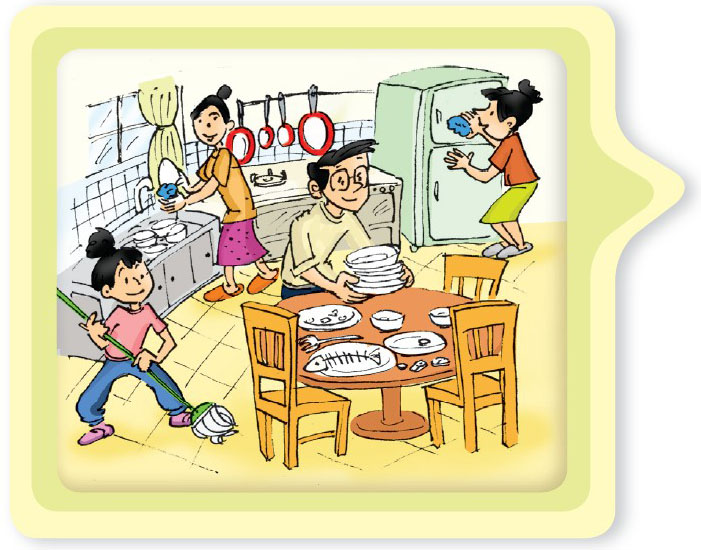[Reading]: Sharing housework
| Site: | HCMUE English Department's Learning Management System |
| Course: | English 10 Online Course (2021) - Ms. Hương Khôi |
| Book: | [Reading]: Sharing housework |
| Printed by: | Guest user |
| Date: | Sunday, 15 February 2026, 1:04 PM |
1. UNIT 1 - READING

We'll start our lesson with 3 parts
(1): Read the passage
(2): Play a game to familiarise yourself with the vocabulary
(3): Vocabulary worksheet
Let's get started!
***
How to start the lesson?
Look to your right-hand side. There is a table of contents.
Click and choose what you want to learn
1.1. Read the text
Read the text below. There is some highlighted vocabulary.
Do you understand the words from the context?
Try to guess their meaning without using the dictionary!
In many cultures, doing housework is considered a woman’s duty. The mother is usually the homemaker, who has to do most of the household chores, while the father is the breadwinner, who is responsible for the family finances. However, it is not good for the mother when the rest of the family does not help out. When families share household chores, it is good for them as individuals and good for all the relationships within the family.
According to psychologists, most people do not realise the enormous benefits that come to a family when husbands and children share the housework. Children who share the housework with their mums and dads do better at school, become more sociable, and have better relationships with their teachers and friends. They learn good skills, are more responsible and tend to be overall good people. When men share the housework, they tend to have better relationships with their wives. Women often feel happy when they see their husbands doing housework because it says, ‘He cares about me and he doesn’t want to put all of the housework on me.’ Women whose husbands do not contribute to the household chores are more vulnerable to illness and tend to think more about divorce.
When everyone works together on household chores, it creates a positive atmosphere for the family and sets a good example for the children. This is especially true if mum and dad can find a way to work well together and are not critical of each other.

1.3. Vocabulary handout
UNIT 1: FAMILY LIFE
READING
1. sociable (a) /ˈsəʊ.ʃə.bəl/: dễ gần gũi, dễ chan hòa, hòa đồng
example: Rob's very sociable - he likes parties.
2. vulnerable (a) /ˈvʌl.nɚ.ə.bəl/: dễ bị tổn thương
example: I felt very vulnerable, standing there without any clothes on.
3. critical (a) /ˈkrɪt̬.ɪ.kəl/: chỉ trích, chê bai, phê phán
example: The report is highly critical of safety standards at the factory.
4. enormous (a) /ɪˈnɔː.məs/: to lớn, khổng lồ
example: He earns an enormous salary.
5. tend (v) /tend/: có xu hướng
example: I think you tend to eat more in the winter.
